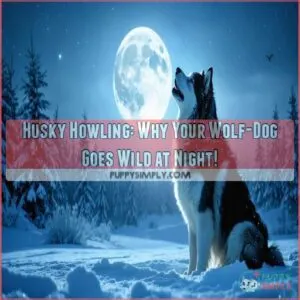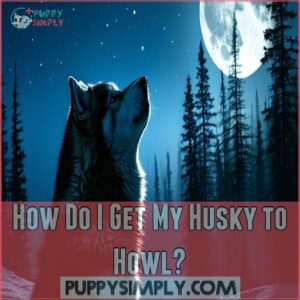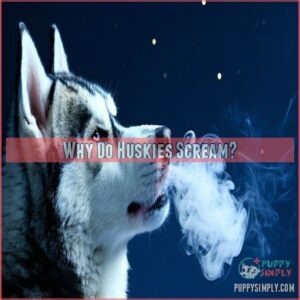This site is supported by our readers. We may earn a commission, at no cost to you, if you purchase through links.
 Husky howling is an instinctive behavior that traces back to their wolf-like roots. It’s their way of communicating, expressing emotions, or reacting to triggers like loneliness and high-pitched sounds (yes, even your singing might set them off!).
Husky howling is an instinctive behavior that traces back to their wolf-like roots. It’s their way of communicating, expressing emotions, or reacting to triggers like loneliness and high-pitched sounds (yes, even your singing might set them off!).
Huskies can start howling as early as 7-8 weeks old, and this vocal habit varies depending on their genetics and personality.
Common triggers include boredom, separation anxiety, or even moonlit nights.
If the howling gets excessive, keeping them engaged with exercise, toys, or training can help. Want to hear your Husky sing on cue—or finally enjoy some quiet? Both are entirely possible!
Table Of Contents
- Key Takeaways
- What is Husky Howling?
- At What Age Do Huskies Start Howling?
- Do Huskies Howl When Left Alone?
- How to Stop Husky Howling
- Why Does My Husky Howl?
- How Do I Get My Husky to Howl?
- Why Do Huskies Scream?
- Husky Howling at Moon
- Can Husky Howls Be Heard Over a Long Distance?
- Is Stifling Howling Beneficial?
- Frequently Asked Questions (FAQs)
- Do Huskies Howl?
- How do you encourage a husky to howl?
- Why does my Siberian Husky Howl?
- Should you stop a husky howling all of the time?
- Why does a Husky howl when left alone?
- Can a husky hear another dog howling and respond?
- Why do huskies howl?
- Can all huskies howl?
- Why do huskies howl and not bark?
- Why doesn’t my husky howl?
- Conclusion
Key Takeaways
- Huskies howl to communicate, express emotions, or react to triggers like loneliness, boredom, or high-pitched sounds—it’s deeply rooted in their wolf-like ancestry.
- You can manage excessive howling by addressing their needs through regular exercise, mental stimulation, and reward-based training.
- Separation anxiety is a common reason Huskies howl when left alone; building their independence gradually and providing engaging toys can help.
- If your Husky doesn’t howl, it might just be their personality or genetics—it’s normal for some to be quieter than others.
What is Husky Howling?
Husky howling is like nature’s own symphony, deeply rooted in their genetic makeup. This vocal behavior comes from their ancestors, the Taimyr wolves, for whom howling was essential for survival. It’s not your average bark; it’s a distinctive, drawn-out sound designed for long-distance communication. Think of it as their way of shouting, “Hey, I’m over here!” across vast, snowy tundras.
Huskies start honing their howling talents as young as 7-8 weeks old. These vocalizations can serve various purposes, from pinpointing their location to expressing emotions like anxiety or frustration. One minute they’re serenading the moon, and the next they’re responding to high-pitched sounds like sirens, baby cries, or even your favorite song—proof of their keen hearing and instinctual drive.
But there’s more to Husky howling than echoes and drama. Environmental triggers, from loneliness to boredom, can set them off. Like a kid trying to get attention, your Husky might howl because they’re feeling left out or unstimulated. While some Huskies are natural chatterboxes, don’t be alarmed if yours is noisier (or quieter) than others—howling genetics vary between individuals.
Embracing their howls while setting boundaries allows you to appreciate this ancient, wolf-like trait without going wild yourself!
At What Age Do Huskies Start Howling?
By the time your puppy reaches 7-8 weeks old, you might hear their early vocalizations turn into howling. It’s impressive how quickly their genetic influence kicks in, driving these wolf-like tendencies. Howling isn’t just random noise—it’s an instinctive form of communication handed down from their wild ancestors. Whether it’s signaling excitement, responding to high-pitched sounds, or grabbing attention, your pup is tapping into something ancient and powerful. As part of their inherited traits, Huskies also use howling for long-distance communication.
Not all Huskies are the same, though. Howling intensity and frequency can vary due to individual breed variations and personality quirks. Some pups barely make a peep while others sound like they’re auditioning for a wolf pack.
- Encourage those baby howls: Play soft recordings of other dogs or wolves. A low volume helps stimulate their instincts without overwhelming them.
- Pay attention to triggers: High-pitched sounds like sirens and certain music notes can bring out their inner diva. Monitor what sets them off to better manage their responses.
- Train early: Use positive reinforcement to teach when it’s okay to howl and when it’s time to stay quiet. Treats and praise go a long way.
- Provide enriching activities: Puzzle toys and games help channel their energy while reducing unnecessary howling.
Understanding why your Husky howls is key. Some soft, joyful tones may signal contentment, while loud, urgent howls suggest they’re calling their “pack.” Either way, your puppy’s howling is part of their charm—a nod to their wild and a conversation starter in your household. Embrace it with a little patience and guidance!
Do Huskies Howl When Left Alone?
Leaving your Husky alone can sometimes feel like stepping into a symphony of howls. This behavior often stems from separation anxiety, as Huskies are social creatures who don’t thrive in solitude. Their howling becomes a call for connection, a vocal "Where are you?" to their missing pack.
But don’t worry—there are ways to ease their alone time woes and bring some silence to your household. Start by understanding why they’re howling: is it anxiety, boredom, or loneliness? Mental stimulation works wonders for bored Huskies. Puzzle toys or treat-dispensing games keep their minds busy while you’re away.
To tackle separation anxiety, gradually build up their tolerance for being alone. Step out for short periods, then increase the time as they adjust. Add soothing background sounds like music or white noise to create a comforting environment.
Here are a few howling solutions:
- Provide plenty of daily exercise before leaving.
- Keep them entertained with chew toys.
- Leave an old shirt with your scent.
- Monitor their progress with a pet camera.
With patience and these quiet techniques, your Husky will learn to embrace their independence without the noisy serenade.
How to Stop Husky Howling
If your Husky’s howling is keeping you (and maybe the neighbors) awake, don’t worry—there are effective ways to address it.
By tackling their physical needs, emotional triggers, and learned habits, you can reduce the nightly wolf serenades while keeping your pup happy and healthy.
Exercise
Tired of your Husky howling up a storm? A solid daily routine packed with high-energy exercise might be the answer.
Huskies thrive on movement, so ramp up the exercise intensity with long walks, jogging, or even sled-pulling activities.
Switching up exercise types, like incorporating fetch or agility training, keeps playtime exciting and reduces boredom. These breed differences shine—they need more than a quick stroll to burn off steam.
Regular, engaging activities both tire them out and curb those vocal outbursts, leaving you both happier (and with less noise).
Alternative Behaviors
If your Husky’s howling is turning heads, guide their energy toward alternative activities.
- Teach commands like “sit” or “fetch” to redirect vocal tendencies into focused behaviors.
- Provide puzzle toys or bones for chewing, giving them a productive outlet when bored.
- Encourage physical games like running or jumping, which burn off energy and reduce howling triggers.
- Create digging zones to mimic natural instincts while keeping them engaged.
Stay consistent, and your furry companion might howl less and enjoy more!
Separation Anxiety
Separation anxiety can turn quiet moments into a howl-fest. Anxiety triggers like being left alone or changes in routine are common culprits. Huskies are pack animals—they hate being left out.
Crate training, when done positively, can create a safe, cozy den where your pup feels secure. Toss in comfort items, like your scent on a blanket, to ease their nerves.
Play therapy before you leave helps burn energy and settle them down. For nighttime howling, try leaving a soft light or calming background sounds for reassurance.
In severe cases, medication options prescribed by a vet can take the edge off their worry. Pay attention to what sets them off, and address the root of their stress for a quieter, happier Husky. You’ve tried alternative behaviors, but what about when your Husky howls because they’re lonely?
Why Does My Husky Howl?
Understanding why your Husky howls is like solving a puzzle—it’s all about piecing together their needs and instincts. Huskies are vocal by nature, and their howling could stem from boredom, pack instincts, attention-seeking, or even potential health issues. Sometimes, it’s as simple as them responding to environmental stimuli, like sounds that catch their keen ears.
Huskies are social creatures with deep roots in pack mentality. When they howl, it could be their way of calling out to you—essentially saying, “Hey, where’s my pack?” Loneliness can also amplify this behavior, especially if they’re left alone for long periods. Remember, these dogs thrive on company and interaction. Their ancestral howling traits are also a strong indicator of their need for social connection.
Here are five reasons your Husky might be howling:
- Pack Instinct: Huskies inherit this from their wolf ancestors. Howling is how they communicate across long distances. Without a "pack" around them, they might howl just to feel connected.
- Attention-Seeking: Sometimes, it’s their way of grabbing your focus. Maybe your Husky feels ignored and knows their howl gets a reaction from you—they’re quite clever that way.
- Boredom: A Husky with pent-up energy is a vocal Husky. Without adequate exercise or stimulation, their howling might simply be their way of burning off extra energy.
- Response to Sounds: High-pitched sirens, crying babies, or even harmonicas can trigger their urge to howl. It’s almost like an instinctual karaoke session they can’t resist!
- Health Issues: Pain or discomfort might be behind their vocal outbursts. If your Husky’s howling is sudden or persistent, it’s worth checking with a vet to rule out potential problems.
Understanding the cause helps you tackle the behavior. Whether it’s extra playtime to curb boredom or giving your Husky more attention, addressing their needs will often quiet the noise. But remember, howling is natural—it’s part of what makes your Husky such a unique and lovable companion!
How Do I Get My Husky to Howl?
Getting your Husky to howl can be a fun way to bond and tap into their natural instincts.
Using high-pitched sounds, training techniques, and an understanding of their genetics, you can encourage this unique vocalization.
High-pitched Sounds
Ever notice how a siren or a baby’s cry gets your Husky howling like it’s on stage? Huskies have a natural sound sensitivity to high-pitched noises, thanks to their wolf ancestors. These frequency responses trigger an instinctual reaction, almost like a call to their pack.
If you want to encourage this, try experimenting with different pitch triggers—playing an instrument, whistling, or even mimicking a howling sound yourself. Some suggest that a protective instinct response may also be a contributing factor to this.
But don’t overdo it. Constant exposure might lead to noise aversion, especially if they associate it with stress. A mix of positive reinforcement and gentle training works best.
Use the table below to balance fun and structure.
| Trigger | Expected Reaction | Reinforcement Tip |
|---|---|---|
| Whistle | Possible howling | Reward with treats |
| Siren recording | Strong howling | Calm interaction |
| Musical notes | Mild howling | Playtime or praise |
Genetic Traits
Your Husky’s howling isn’t just a quirky trait—it’s rooted in their genetic inheritance, tying them closely to wolf ancestry. How often and how loudly they howl can depend on their parents’ vocal tendencies. If their lineage is full of frequent howlers, chances are your pup might’ve inherited those habits too! This also means you’ll want to keep in mind Husky Howl Training methods that work best for your dog.
Breed differences play a role, with Huskies having a natural flair for long, wind-resistant howls, perfect for their ancestors’ icy environments. Even as puppies, their howling can start, usually around 2-3 weeks old, and grows stronger with age.
Here are five ways understanding genetics can help:
- Predict howl variations based on lineage.
- Spot triggers tied to instincts.
- Address boredom with exercise.
- Adapt training methods to their nature.
- Understand puppy howling’s early roots.
Training
Training your Husky to howl (or stop howling) takes a mix of patience, strategy, and a little creativity. Start by introducing command training. For instance, use a “speak” command paired with positive reinforcement, like treats or praise, when they howl on cue. Once mastered, you can teach the “quiet” command using the same approach. Remember, consistency matters—reward successes and ignore howling that isn’t prompted.
Physical exercise is equally important. A tired Husky is less likely to howl aimlessly, so aim for at least two hours of daily activity.
If separation anxiety fuels the behavior, gradually teach your Husky to manage being alone by associating your absence with rewarding experiences. Patience is needed, and while progress won’t happen overnight, their improvement will absolutely be worth the effort!
Why Do Huskies Scream?
Huskies don’t just howl—they scream. And when they do, it can catch even the most seasoned dog owners off guard. These vocal bursts can range from excitement to frustration screams, pain screams, or instinctual reactions to certain triggers.
Let’s break it down. If your Husky screams when they’re left alone, you’re likely hearing separation anxiety in full force. They’re social animals, bred to bond tightly with their pack (that’s you!). When you’re not around, that empty-house silence can amplify their need to reach out—sometimes at the top of their lungs. On the flip side, happy screams often surface during play, reunions, or when something incredibly exciting happens (like seeing the leash come out for a walk).
Screaming can also signal discomfort or distress. Pain screams may occur if your Husky’s hurt or dealing with health issues, like hip dysplasia or joint pains common in this breed. It’s essential to pay close attention to the scream’s intensity and look for other signs—limping or avoiding movement might tell you something’s up.
Need help managing this ear-piercing habit? Start here:
- Reward quiet behavior: Praise and treats when your Husky isn’t screaming.
- Engage them socially: Increase bonding time with games, walks, or puzzles.
- Redirect energy: Scream triggers like boredom can be eased with extra exercise or mental stimulation.
Understanding what sets them off can go a long way in easing the chaos while still letting them express their Husky personality.
Husky Howling at Moon
When your Husky howls at the moon, it can feel like a scene straight out of a werewolf myth, but this behavior is rooted in instinct, not superstition. Huskies, with their wolf-like lineage, have a natural tendency to howl, often influenced by nighttime habits and triggers you mightn’t even notice. The moon itself doesn’t actually cause this howling—rather, it’s the quiet of the night or distant sounds that set your pup off. Some Husky owners even say their dogs seem more vocal during a full moon, but this could just be due to increased activity and sounds during the lunar cycle’s brighter nights.
To handle moon howls while keeping your pup happy, try understanding their triggers and needs.
Here’s how you can address it thoughtfully:
- Know the cause: Check for disturbances like high-pitched sounds, loneliness, or stress that might be encouraging nighttime howling.
- Provide distractions: Engage them in calming activities before bedtime. A good walk or puzzle toy might do the trick.
- Teach alternatives: Training your Husky to respond to commands like “quiet” can create boundaries without silencing healthy communication.
- Let them express: Remember, howling is natural for Huskies. Allowing occasional howls can satisfy their instinct without driving you up the wall.
Patience and understanding go a long way in fostering harmony!
Can Husky Howls Be Heard Over a Long Distance?
Ever wonder how far a Husky’s howl can actually travel? Their howls aren’t just loud—they’re designed for long distances, thanks to their incredible vocal projection and wide frequency range. It’s no accident that their howls cut through the air, echoing far and wide. These sounds aren’t just noise; they’re built for survival, communication, and even a little drama when the mood strikes.
Several factors influence just how far a Husky’s howl can go. Their howl range thrives in open terrain, where fewer obstacles like buildings or trees block the sound. On windy nights, their calls may travel even farther, especially when the wind’s carrying their voice along. It’s nature’s megaphone in action. By understanding and triggering their automatic response, you can encourage your Husky to howl more frequently.
Want to break it down? Here are five key insights about Husky howls:
- Impressive intensity: Huskies’ howls are louder and sharper than most breeds, designed to pierce through noise and distance.
- Weather assistance: Wind, rain, and other conditions can amplify or help carry their howls farther.
- Call and response: Other Huskies—or even distant dogs—often reply, making the howling contagious.
- Instinctual vibes: Long-distance howling ties to their wolf ancestry, used for pack coordination or warning signals.
- Social and survival tools: Whether it’s distress, joy, or plain communication, their howls serve practical and emotional purposes.
So next time your Husky fills the night with their "song," just know—it’s like they’re sending a love letter across miles!
Is Stifling Howling Beneficial?
- Understand howling’s purpose: It’s rooted in genetic traits and serves as a form of expression or communication.
- Address the stifling impact: Ignoring or punishing howling damages your bond and creates anxiety.
- Redirect excess energy: Daily exercise or interactive play curbs boredom-driven howls.
- Soundproof your space: Daily exercise can also help with gradual desensitization overcoming separation anxiety, as it allows your dog to gradually get used to being alone.
- Reinforce calm behavior: Use reward-based training to encourage quiet moments without denying their instinct.
Remember, meeting your husky halfway respects their wolfish roots while keeping peace in your home.
Frequently Asked Questions (FAQs)
Do Huskies Howl?
Think of a Husky’s howl as its personal Wi-Fi signal, linking it to its roots.
Yes, Huskies howl—whether they’re mimicking wolves, responding to high-pitched sounds, or expressing emotions.
It’s natural communication, not noise.
How do you encourage a husky to howl?
Encourage your Husky to howl by mimicking their vocalizations, playing high-pitched sounds, or introducing howling prompts like sirens or music.
Reward their howling with treats, creating positive reinforcement and building their confidence to vocalize.
Why does my Siberian Husky Howl?
Your Husky howls to communicate, tapping into instincts inherited from Taimyr wolves.
It could be signaling loneliness, reacting to sounds like sirens, or expressing excitement.
Their howling is natural, expressive, and uniquely Husky.
Should you stop a husky howling all of the time?
Stopping a Husky from howling constantly isn’t always the best approach.
Address triggers like boredom, anxiety, or health issues first.
Balance training with understanding—it’s their way of communicating, not just making noise.
Why does a Husky howl when left alone?
It’s like the Husky’s built-in alarm clock goes off, screaming, “Where’s my pack?!”
Separation anxiety kicks in, triggering their instinct to howl—a call to reconnect, fueled by their social nature and wolfy ancestry.
Can a husky hear another dog howling and respond?
Yes, Huskies can hear another dog howling and respond instinctively.
Their sharp senses and pack communication roots trigger this reaction.
It’s like they’re saying, “I hear you, buddy!” across the canine network.
Why do huskies howl?
Huskies howl to communicate over long distances, express emotions like loneliness or excitement, or react to high-pitched sounds.
This behavior stems from their wolf ancestors, reinforcing social bonds and addressing environmental or emotional triggers.
Can all huskies howl?
Not every Husky howls.
While most inherit their ancestors’ howling instinct, some are quieter due to individual differences.
Genetics, environment, and personality all play a role, so don’t worry if yours keeps their voice more private!
Why do huskies howl and not bark?
They howl to communicate across distances, just like their wolf ancestors.
Unlike barking, howling travels farther and conveys complex emotions.
Picture it as their long-distance text message, while barking is more like a quick notification.
Why doesn’t my husky howl?
Ever wonder why your husky skips the howling?
Some simply inherit quieter genes, while others may not feel triggered by their environment.
As long as they’re healthy and happy, enjoy your unique, peaceful companion!
Conclusion
Think of Husky howling like Mother Nature’s walkie-talkie—it’s their way of connecting with the world.
Whether triggered by loneliness, a full moon, or your favorite playlist, your Husky’s vocal habits are rooted in instinct.
By addressing their needs with exercise, training, and attention, you can manage howling while keeping them happy and healthy. Embrace your Husky’s quirks—they’re part of what makes them special.
Want a quiet night or a duet? The choice is yours with the right approach. Manage howling effectively.














